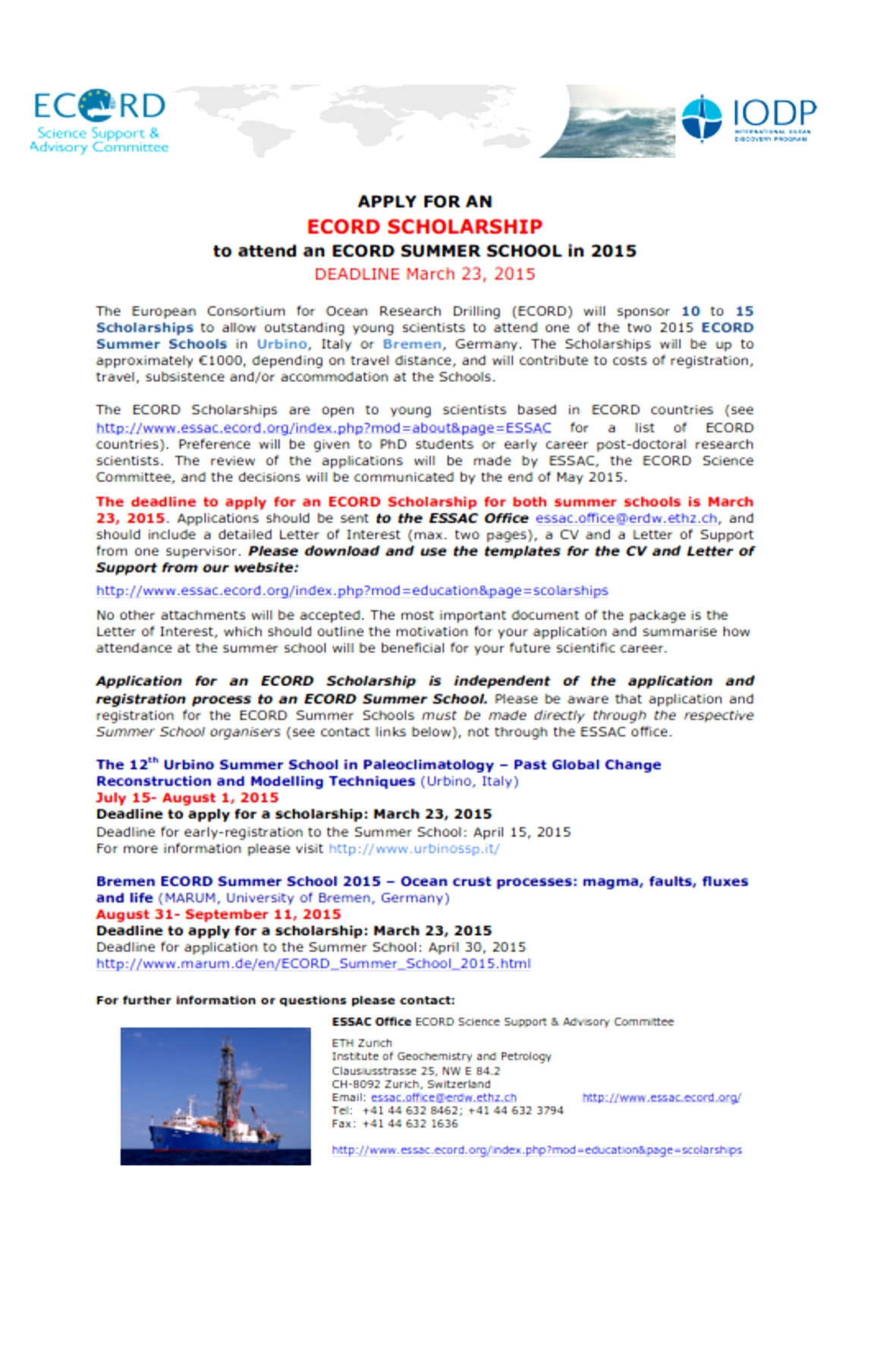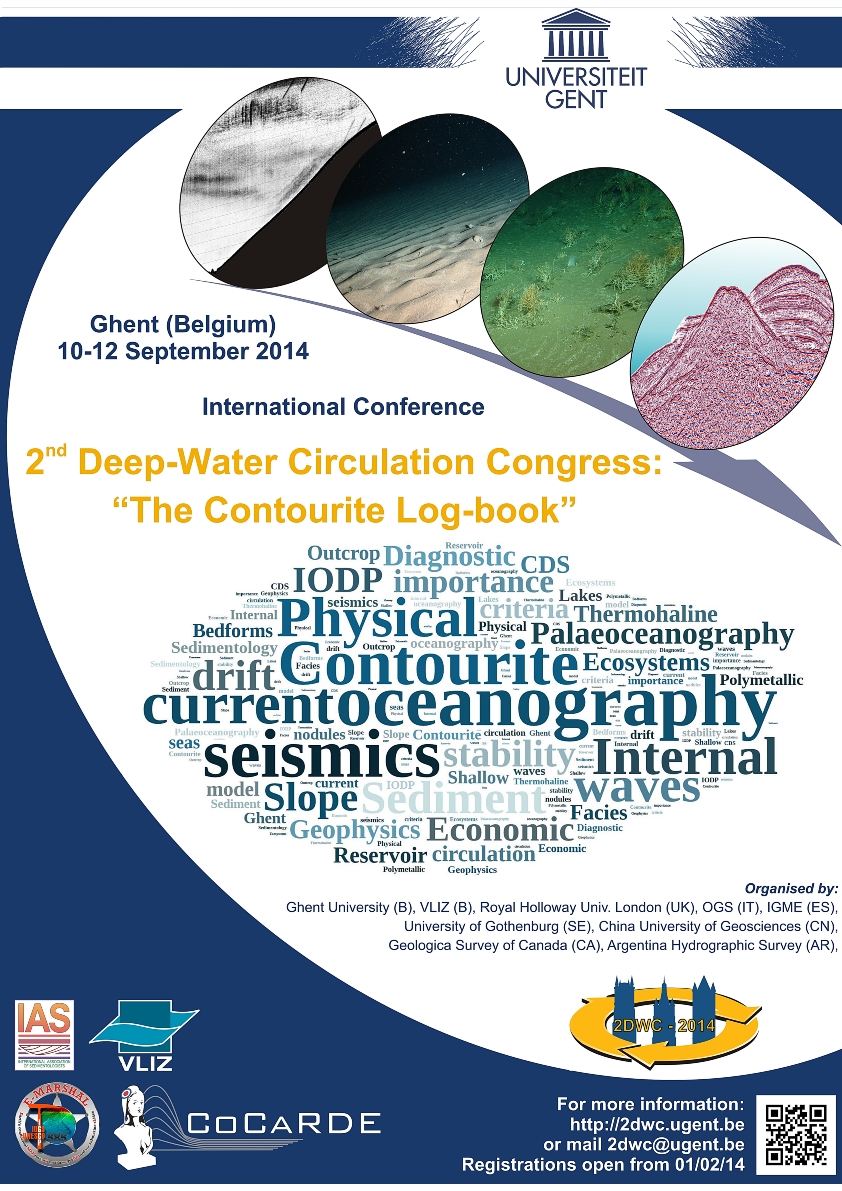Archive
2015, March 23: OPEN CALL for ECORD Scholarships
2015, June 22-25th: IAS Meeting of Sedimentology, Krakow, Poland


31st IAS MEETING OF SEDIMENTOLOGY
SS2: SEDIMENTOLOGY AND GEOBIOLOGY OF CARBONATE BUILD-UPS
Krakow, Poland, 22-25 June 2015
Carbonate build-ups include a wide range of structures, showing either evidence of framework, or relief, or both. They have been described from such diverse depositional environments as modern and ancient shelves of all latitudes, and from shallow to deep settings. The session will focus on our understanding of build-ups as controlling factors of substantial local geomorphological change and sediment production; on their record and role in respect of the ongoing and past environmental change, and on the phenomena involved in their inception, development, and burial or dismantling. We invite contributions on the sedimentology, paleontology, stratigraphy, paleoecology and (bio)geochemistry of build-ups across their full range of distribution in space and geological time, as a prominent evidence of the continuous interaction between biosphere and lithosphere along the Earth history. This session is endorsed by ESF, through the COCARDE Research Network.
For further information, please contact Daniela Basso ( )
See you in Krakow!
NEWS: Four travel grants, funded by the European Science Foundation (ESF) through the COCARDE network, for the participation of early-career scientists (PhD students, post-doctoral researchers) in the special session SS2 have been awarded to:
More details concerning the COCARDE grants are available in the guidelines for ESF-COCARDE Travel Grants; for further information please contact agostina.vertino@unimib.it.
2015, March 16: Deadline for travel grants, MD194 Eurofleets meeting


Call for 8 GRANTS for the participation in the
MD194 EUROFLEETS POST-CRUISE MEETING
5th of May 2015, Rabat, Morocco
The European Science Foundation (ESF), through the COCARDE network programme, funds 8 grants for early-career scientists to participate in the MD194 EUROFLEETS POST-CRUISE MEETING.
The grant call is open until March 16, 2015. Applications must be submitted by email to Silvia Spezzaferri (silvia.spezzaferri@unifr.ch), Chair of the COCARDE-ERN Steering Committee, with cc. to Agostina Vertino (agostina.vertino@unimib.it), COCARDE- ERN coordinator.
Applications must include the documents listed below:
1) Motivation cover letter of the applicant (max one A4 page);
2) Short outline of the applicant current research (max one A4 page);
3) Short curriculum vitae (max one A4 page);
4) Abstract for oral or poster presentation (max 200 words)
5) Travel cost estimate.
The requested documents have to be submitted as a single PDF.
COCARDE grants will cover travel expenses, overnight stay and meals. Please download the guidelines for Science Meeting Grants.
In order to allow the participation of COCARDE grantees in the subsequent RCMNS Colloquium, flight tickets will be refunded if the arrival and departure dates will be comprised between the 4th and the 12th of May 2015. However, COCARDE grants will cover only overnight stay and meals from the 4th to the 6th of May 2015. For further information or queries, please contact Agostina Vertino (agostina.vertino@unimib.it)
21-22, October, 2014. Workshop: Préparation de la Convention UNESCO "Moroccan Royal MoundHeritage Route"
2014, August 18-22: COCARDE session at ISC Geneva
Conveners: Silvia Spezzaferri, Anneleen Foubert (University of Fribourg), Agostina Vertino (University of Milan-Bicocca), Andres Rüggeberg (GEOMAR Kiel) and Jean-Pierre Henriet (Ghent University)
This session aims to scrutinize parallelism and contrasts between carbonate mound systems in the present and in the geological record to deepen our insights in their basic drivers and functioning. It frames within the open research network COCARDE fostering carbonate mound research from different perspectives.
2014, Sept. 10-12: Second Deep-Water Circulation Congress, Ghent (Belgium)
2014, June 10-13: COCARDE Workshop-Field Seminar Denmark


COCARDE Workshop and Field Seminar, Denmark, 10-13th June 2014
Conveners:
Bodil W. Lauridsen (University of Copenhagen)
Morten Bjerager (Geological Survey of Denmark and Greenland, GEUS)
Cold-water Carbonates from the Palaeozoic to the Recent – Combining outcrops studies and geophysical imaging
Carbonate mounds are known throughout the geological history from Late Neoproterozoic to the recent forming at shallow to deep waters and at low to high latitudes. They are defined as morphological features formed through complex interactions between biological and geological processes under suitable hydrodynamic conditions.
Fossil cold-water carbonates from Denmark and the Arctic region have been a main research area for many years in Denmark. The carbonates form excellent reservoirs in the North Sea and they are also target for oil exploration in the northern part of the Atlantic Ocean. A presentation and discussion of these cold-water carbonates are therefore the aim of the proposed workshop. The geophysical imaging of the carbonates includes a wide range of seismic and georadar acquisitions.
The main focus of the field seminar will be the Cretaceous cold-water carbonates reservoir analogues and the Paleocene coral and bryozoan mounds in the Danish Basin. The Danian mounds show strong similarities to the coral mounds ecosystems encountered at high latitudes in the North Atlantic today. Modern carbonates and the future of those in a global warming context will also be discussed.
Researchers from academia and industry will participate in the COCARDE meeting. The European Science Foundation (ESF) will entirely fund the participation of 7 junior scientists (master students, PhD students, post-doctoral researchers) selected through a competitive procedure. More information can be found herein.
2013, Sept. 23-27: COCARDE Workshop-Field Seminar Sicily


COCARDE Workshop and Field Seminar
Sicily, 23-27 September 2013
Bridging off-shore and on-land research on carbonate mounds:
common concepts and techniques
--------------------------
Carbonate buildups from Sicily: Triassic to Quaternary examples
The itinerant COCARDE Workshop 2013, in Sicily, aimed to gather scientists from different cultural backgrounds (geophysicists, sedimentologists, marine geologists, palaeontologists, oceanographers etc.), from academia and industry, in order to drive an active discussion on the foremost insights gained from recent off-shore and on-land research on carbonate mounds. One of the main goal of the workshop was to promote and facilitate the collaboration between the two scientific communities working on ancient and on modern carbonate buildups.
After a short introductive set of presentations, held at the University of Catania, the participants were involved in a two-and-a-half-day field seminar through the diverse landscapes of Sicily. Junior and senior scientists debated on carbonate systems by visiting well exposed build-ups formed in different paleoenvironmental settings and times. The field trip was followed by a two-day intensive workshop which will include key oral and poster presentations on Geosphere-Biosphere coupling processes in fossil and Recent carbonate factories. More information can be found in the final programme and abstract volume.
The event was co-organized by two supporting institutions of the ESF COCARDE Research Networking Programme: the University of Milano-Bicocca (Agostina Vertino, Daniela Basso) and the University of Catania (Antonietta Rosso). The field seminar was led by the workshop conveners in collaboration with Pietro Di Stefano (University of Palermo), Rosanna Maniscalco (University of Catania), Marco Taviani (CNR – ISMAR, Bologna) and Barbara Cavalazzi (University of Bologna).
The European Science Foundation awarded 6 grants to fully cover the participation of junior scientists.
2013, June 3: Call for abstracts - IAS 2013, Session: Microbial influence on deposition
CALL FOR ABSTRACTS: 30th IAS MEETING OF SEDIMENTOLOGY
University of Manchester
2nd - 5th September 2013
Session T 9.2: Microbial influences on deposition, diagenesis and petrophysical character of sediments
Conveners: Anneleen Foubert (University of Fribourg, Switzerland), Stefan Schroeder (University of Manchester, UK)
Microbial life interacts with and influences its environment through biological and physico-chemical processes. A thorough understanding of these processes will lead to an accurate interpretation of microbial life and its products in past and extraterrestrial environments. This session provides a platform for sedimentological, geochemical and geomicrobiological studies investigating microbial-environment interactions, for example microbial activity in extreme environments (acid mine drainage, anoxic, hypersaline, hydrothermal environments), microbialite formation and taphonomy, microbially-induced sedimentary structures. We particularly invite contributions addressing the influence of microbial activity on mineral authigenesis and dissolution, and associated changes in petrophysical properties.
Deadline for abstract submission is June 3, 2013. Guidelines for abstract submission and registration are available on the conference website: http://www.sedimentologists.org/meetings/ims.
2012, July 1: Magellan+Workshop Series program: Call for Proposal
ECORD/ICDP – MagellanPlus Workshop Series Program
- Short summary (max 500 characters) stating the purpose of the proposed workshop, its location and expected impact.
- Full description (max 2 pages) of the proposed workshop outlining the purpose, rationale, expected impact and number of participants
- Preliminary workshop program
- List of expected participants
- Full budget for the workshop
- CV (max. 1 page) plus a list of international, peer-reviewed publications for the last 5 years, of main applicant.

